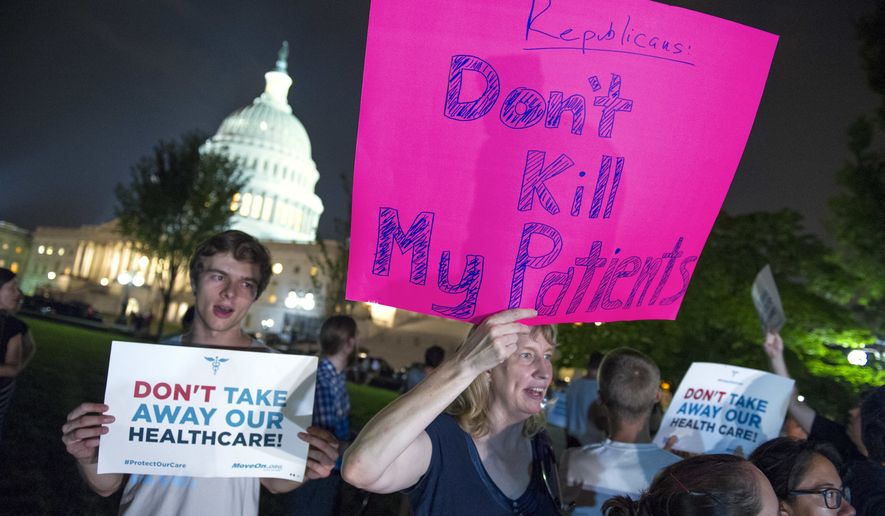Top conservatives challenged President Trump on Monday to revoke the special $12,000 Obamacare subsidy members of Congress receive each year courtesy of taxpayers, saying the best way to force lawmakers back to the bargaining table is to force them to fully obey the struggling law.
Mr. Trump appears to be on board, having tweeted twice in recent days that it was unfair for Congress to give itself extra help to pay for insurance premiums when average Americans are struggling.
“Why should Congress not be paying what public pays,” the president wondered on Twitter on Monday. Two days earlier, he decried the money as “bailouts” for members of Congress and insisted they “will end very soon!”
Analysts said Mr. Trump can do more than tweet about it: He can take unilateral action, without having to wait for Congress, by ordering his administration to revoke the Obama-era policy that ruled — despite what they called a clear prohibition in law — that members of Congress could keep collecting money.
“It’s illegal. It’s a flagrant violation of the law,” said Josh Blackman, an associate professor at the South Texas College of Law.
Several congressional Republicans said they will work on Capitol Hill to change the law and force lawmakers to fully abide by the 2010 Affordable Care Act.
They have tried in the past with no success. Both Democrats and Republicans have resisted efforts to strip out the payments, which cover up to 75 percent of their health insurance premiums.
Some members have voluntarily given up the payments and are working to force their colleagues to do the same. Sen. Ron Johnson, Wisconsin Republican, said he pays a check every three months back to the government as reimbursement for the subsidy, which he said works out to more than $12,000 a year.
Given members’ $174,000 annual salary, the $12,000 is serious, he said, but nowhere near the pain constituents making just $50,000 have to face.
“Until members of Congress are in that same position, we’re not going to fix that problem,” he said. “This is unfortunately probably the only way we’re going to be able to do it.”
Conservatives say that if lawmakers share the pain of average Americans, then they will return to the negotiations and work out a deal that fixes Obamacare — ideally by controlling skyrocketing premiums.
Mr. Johnson, however, acknowledged that his plan to cancel the taxpayer subsidy was “probably not wildly popular” among fellow senators.
The fight over Congress’ role in Obamacare dates back to 2009 and 2010, when the health care law was being debated.
Sen. Chuck Grassley, Iowa Republican, managed to attach an amendment requiring members of Congress and their office staffers to give up their policies under the Federal Employees Health Benefits program and enroll in Obamacare exchanges.
Many legal analysts said that meant members and staffers would have to give up the employer contribution that covered up to 75 percent of premiums, just as most other exchange customers are required to do.
But the Obama administration’s Office of Personnel Management, under intense lobbying from members of Congress who feared personal financial hardship and losing staff, decided to continue the employer contribution.
Democrats deflected questions about Mr. Trump’s threats, saying they were more worried about the president suggesting he might withhold payments to insurers.
“I’ve heard nothing about colleagues being concerned about their own insurance,” said Sen. Richard Blumenthal, Connecticut Democrat.
Sen. Ron Wyden, Oregon Democrat, said Mr. Trump needs to “deal with the priority questions, which is stability for the private market [and] holding down the cost of prescription drugs.”
“I’ve got town meetings scheduled — that’s what people want to talk about,” he said. “I’m going to leave it at that.”
But Sen. Christopher Murphy, Connecticut Democrat, said he was worried about Mr. Trump’s approach to negotiating.
“I think it’s really exceptional. He’s making personal threats against the body of Congress, our staffs and our constituents,” Mr. Murphy said.
The taxpayer subsidies have been an issue for years.
Former Sen. David Vitter, Louisiana Republican, repeatedly tried but failed to force the Senate to vote to repeal the money.
At one point, he asked the Senate’s small-business committee to authorize subpoenas to the D.C. exchange, hoping to pry loose documents. The committee, which Mr. Vitter chaired, refused to back him, with five Republicans siding with Democrats in denying his request.
The D.C. exchange says about 11,000 Capitol Hill personnel are enrolled through the city’s small-business exchange.
Congress argued that its members qualified because each office was a small business.
But Phil Kerpen, a leading conservative activist, said the House and Senate are registered with the IRS as single employers covering thousands of employees, so the explanation that each office is separate is off base. He said congressional officials used “false documents” to duck the law.
He said the public would back the president if Mr. Trump challenges Congress.
“The president absolutely has the power to direct OPM to change this rule,” Mr. Kerpen said.
• Stephen Dinan can be reached at sdinan@washingtontimes.com.
• Tom Howell Jr. can be reached at thowell@washingtontimes.com.




Please read our comment policy before commenting.